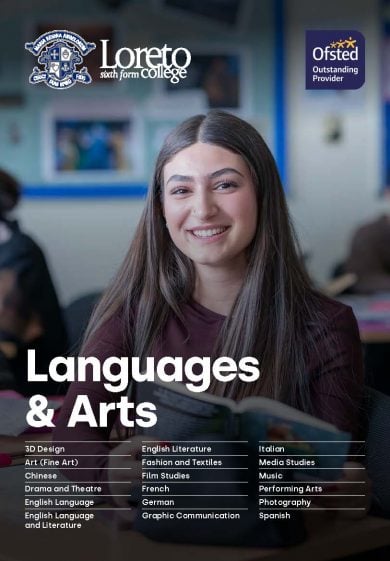Entry Requirements
Click the button to read our faculty brochure or read more about the course below:
- Six GCSEs 9-4 (or A*-C)
- Two from English, Maths OR Science
- Two at least grade 6
Course specific requirements:
GCSE grade 9-6 in Spanish OR native speakers of Spanish on consultation with department at enrolment

A Level Spanish
- Are you interested in social issues and trends?
- Are you curious about political, intellectual and artistic culture?
If so, a modern Languages A level would suit you well!
Languages are a brilliant skill to possess. A language is a skill for life. Both universities and employers are keen to enlist linguists.
Exam board: EDUQAS
Components
Component 1: Speaking
Percentage of total marks: 30%
Method of assessment: Oral exam
The oral examination consists of a presentation and discussion on an Independent Research Project concerning the Target Language country.
Component 2: Listening, reading and translation
Percentage of total marks: 50%
Method of assessment: Written examination 2 hours 30 minutes
Reading, Listening and translation skills concerning the topics covered.
Component 3: Writing
Percentage of total marks: 20%
Method of assessment:
Written examination 2 hours
Two essays based on two literary texts and/or films.
Skills
Alongside developing analytical and interpretative skills, you will improve your communication skills and your ability to understand literature and grammar. You will develop knowledge about matters central to the society and culture, past and present, of the country or countries where the language is spoken.
Careers/destinations
MFL
What GCSE grade do I need to do a language at Alevel?
You need a grade 6 or higher.
How many lessons are there per week?
There are 2 double lessons, totalling 4.5 hours. You will get homework from each lesson and over the week you are also expected to do another 4.5 hours of independent study in order to practice further and develop your own interests in aspects of the culture of the language you study. This will help with your studies in the second year.
How much homework will we get?
Homework is set twice a week after each lesson. This may involve vocabulary learning, reading tasks, listening tasks, translation, grammar tasks, essay work or speaking preparation. Typically, you will get one learning homework and one written homework per week. Homework is usually due for the next lesson unless you are told otherwise.
Do you run any trips abroad?
Yes we do! we have cultural trips to Italy, Spain, France and China and our German exchange. The department also offers work experience in Europe through an external company..
Which exam board do you use?
Our exam boards are:
• Eduqas: French, German and Spanish
• Edexcel: Italian
• Cambridge Pre-U: Chinese
• AQA: Chinese GCSE
How is the A-level course assessed?
There are 3 exams at the end of the course. There is no coursework. The exams are:
• C1 Speaking exam (21-23 minutes, 30%),
• C2 Listening, reading and translation (2 hrs 30, 50%)
• C3 Critical response in writing (2 hrs, 20%)
Do we study literature?
We study a film in Year 1 and a book in Year 2 of the language that you choose to study. The film and the book are studied for exam C3. Students will have to write a 300-word essay about each one in the exam.
How do we learn in lessons? Is it really different to high school?
We do not use a set textbook as these quickly go out of date. Instead, we use a variety of resources such as self-made booklets containing resources from a variety of places to help you learn in different ways. You will be given vocabulary lists, translation, grammar, reading and listening tasks as booklets. Every week you will also work with computers for listening tasks, grammar practice and independent learning. We use websites such as Kahoot and Quizlet to practice vocabulary, grammar and factual knowledge.
How do we work with the assistant?
To help you develop speaking skills, we employ a native-speaker of the language you study, who will work with you once a week during lesson time. They will speak to you individually in a separate classroom on a specific topic for up to 10 minutes. Usually you will prepare something in advance for homework and speak to her about it during the session. You can expect to be asked questions about what you have said. This all helps to build confidence for the final speaking exam.
What kind of person takes a Language A-level and what use is studying a language?
Languages are a brilliant skill to possess. A language is a skill for life. Both universities and employers are keen to enlist linguists.
How different is A-level study to GCSE?
As you will actively choose to study a language at this level, we will expect you to become more independent over the 2-year course. This means using your time in and out of college well, using college resources such as the study centres and library and taking responsibility for your own learning. Your timetable will contain study periods, which mean you can catch up, get homework done or even get ahead with the work. All of these things will prepare you for university study, if this is what you want to do when you
leave Loreto. Knowledge about the Target language culture is something important at A-level which does not get taught much for GCSE. For example: festivals and traditions, music, film, art and history.
What other subjects do languages complement?
A foreign language goes well with any other subject. Arts subjects like other languages but also English, History or Politics. Many of our students also study Maths and Science subjects.

